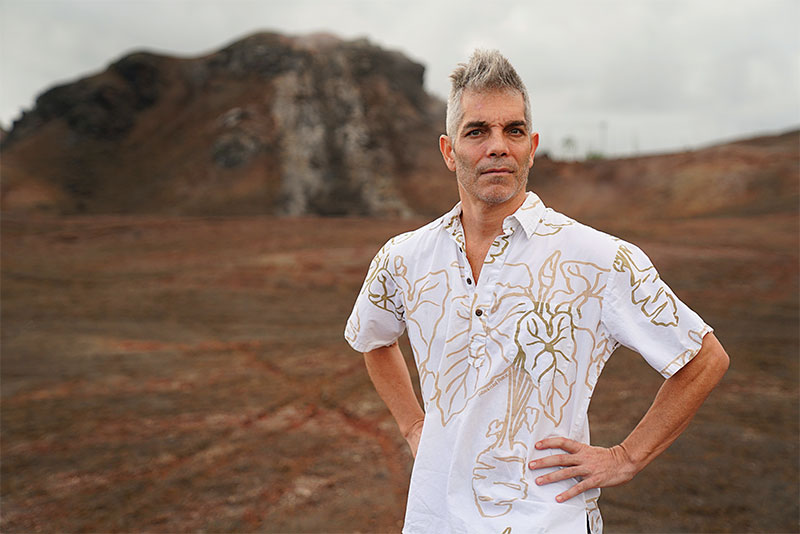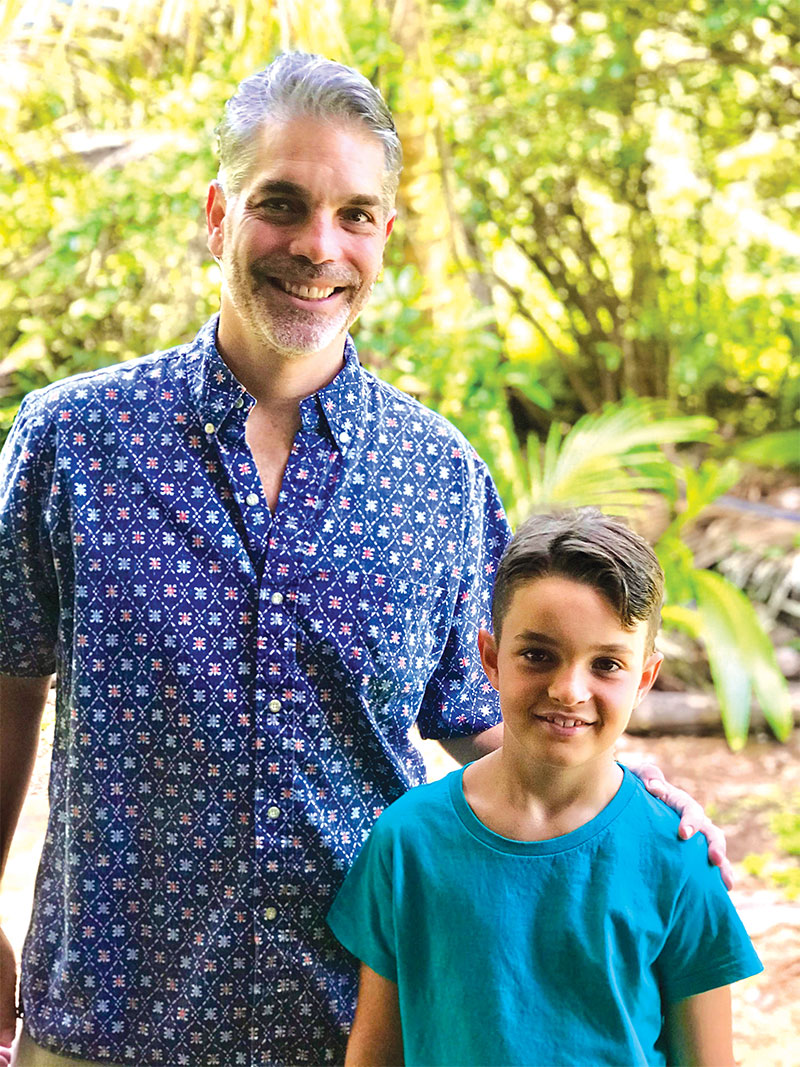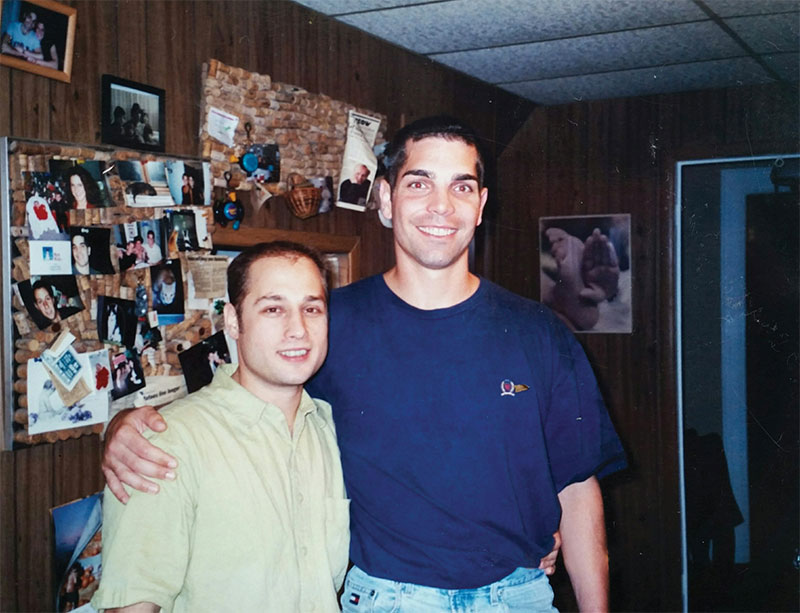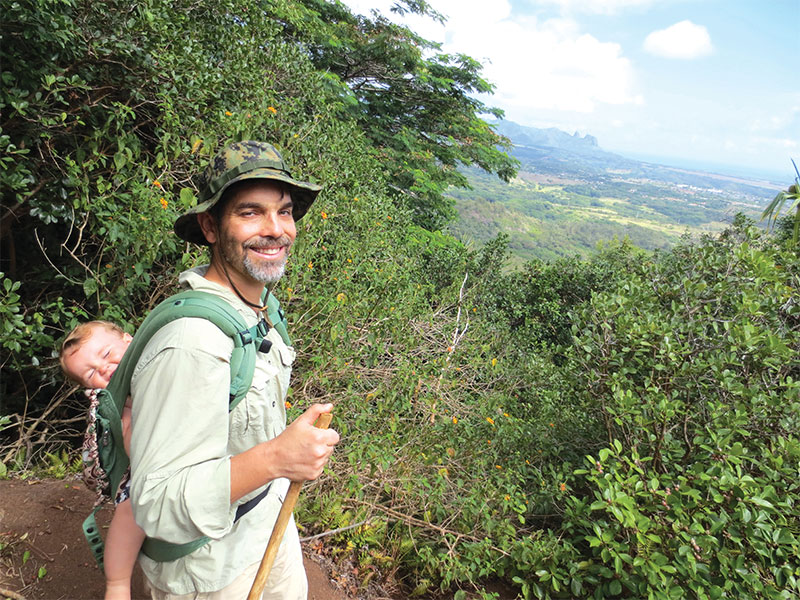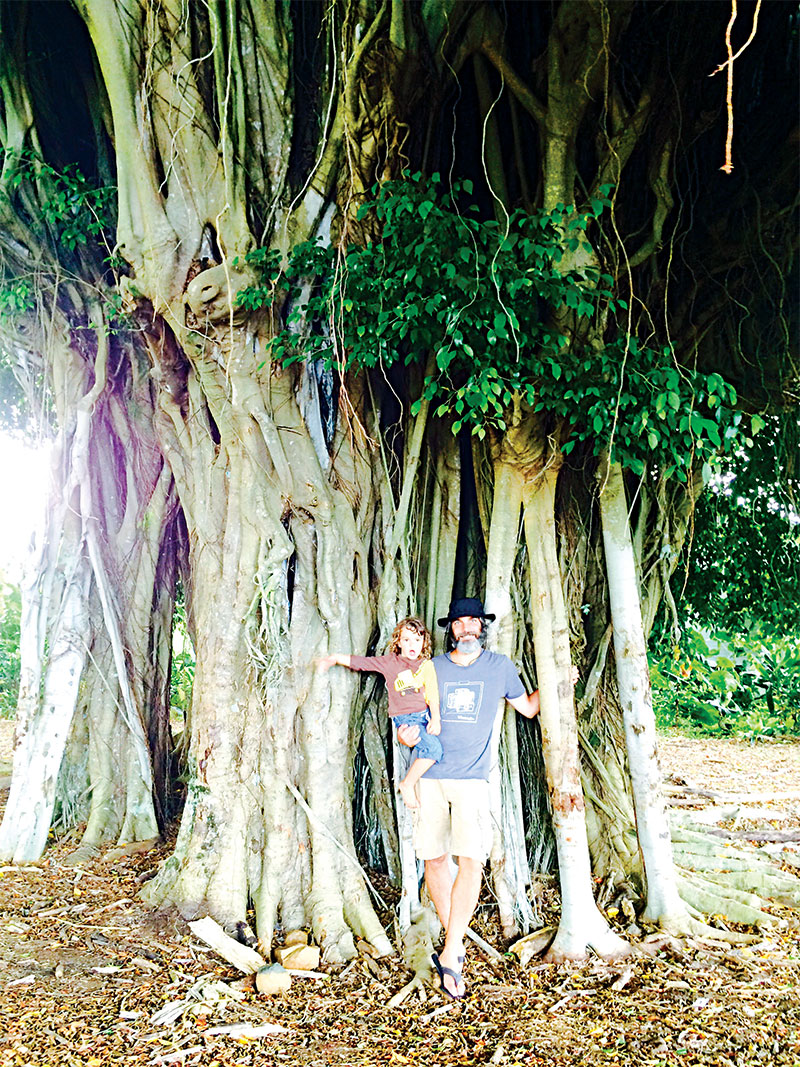Surviving 9/11
On the anniversary of the deadly attacks on the World Trade Center, Hawai‘i resident Paul “Pablo” Sanchez reflects on that fateful morning when he and his co-workers escaped death.
The morning of Sept. 11, 2001, seemed like any other day for Paul “Pablo” Sanchez. He had just grabbed an egg sandwich and some orange juice for breakfast when he hopped aboard an elevator bound for the 92nd floor of the World Trade Center’s Tower 2 — an ascent that normally took him about 10 minutes to complete.
A relatively new recruit for the insurance company Aon Corp., Sanchez arrived eager to get back to his normal duties after he and his cubicle mates had been stuck in an insurance class the day before.
Less than 24 hours later, they were all back in the office making a fuss about how boring the previous day’s session had been.
And then it happened. In an instant, theirs and everyone else’s world changed.
As Sanchez recalls, “We’re all there talking and complaining and commiserating, and all of a sudden the sky turns black, like it … rained so hard. Then the next few seconds, the entire sky seemed to be night, and I guess that’s when the plane hit the other building, because you could feel the radiant heat from whatever exploded … I didn’t see (the first tower) get hit, but I did see the sky change colors … It was quite intense, and so I immediately ran for the stairs. I didn’t go to the elevators.”
As for his breakfast: “I left my sandwich and my orange juice.”
Sanchez sprinted down the stairs to the 78th floor express elevator, where he met up with two of his co-workers, Peter Webster and Diane Murray. Together, the trio quickly descended the stairs, as the corridors grew suffocatingly crowded with occupants who were just as desperate to get out of the building.
“We found the next staircase on the 44th floor and we started going down that one, and now the stairs are crowded with lots of people, debris, clothes, coffee cups. It’s seeming a little bit more serious now (as) people are crying,” explains Sanchez, who estimated there were roughly 600 workers on the 92nd floor alone.
“Finally, we made it down to maybe the 42nd or 40th floor, and all of a sudden I feel the building shake, like I felt it rumble. None of us really know what it is,” he recalls, “but it turns out, that’s when we were hit by the (second) airplane.”
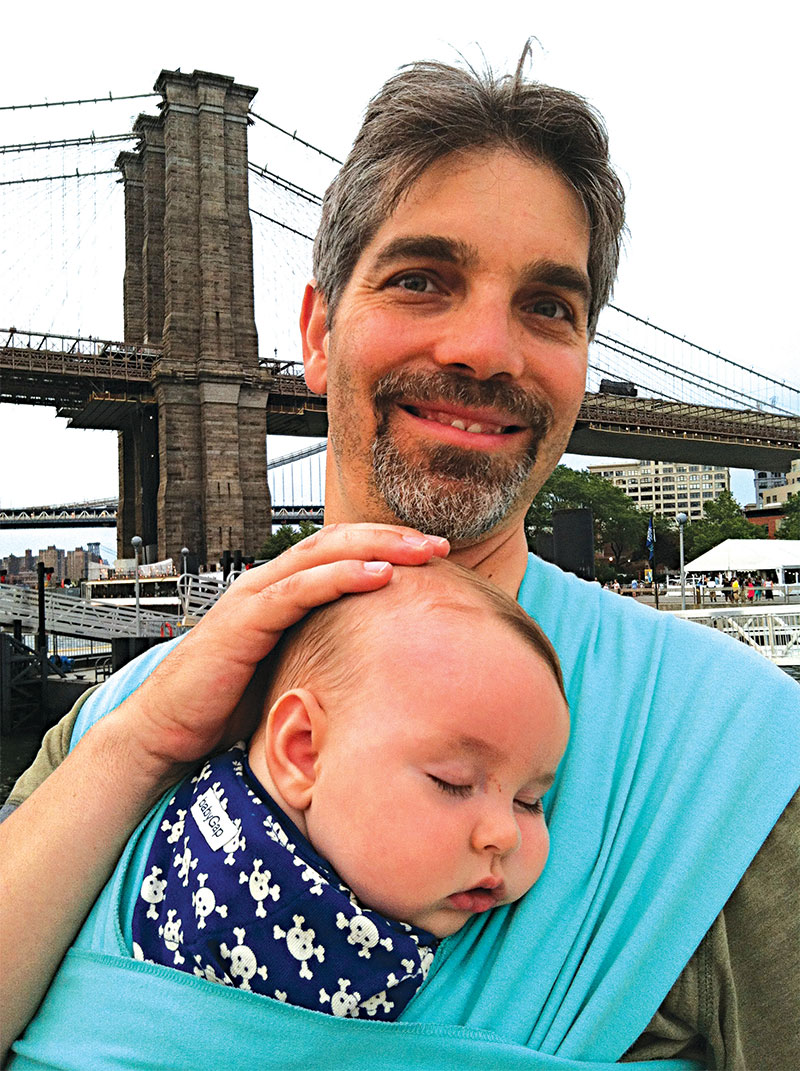
Paul “Pablo” Sanchez stands in New York City with his newborn son, Zy, with the Brooklyn Bridge in the background.
Twenty years after the deadliest attack on U.S. soil, Sanchez, a resident of the Big Island, still can’t shake the memories of that fateful day when two commercial airplanes hijacked by terrorists flew into the center’s twin towers in New York City.
The catastrophe caused the structures to collapse and resulted in the deaths of nearly 3,000 people and injuries to thousands more.
In thinking back on the events of that morning, Sanchez explains that after he and his co-workers were finally able to reach the World Trade Center lobby, emergency personnel were already on hand barking orders for everyone to get out of the area.
They also shouted at people to not use their cellphones, but Sanchez chose to disregard the advice.
“The first thing I did when I got out of the building is I picked up my cellphone and it actually worked. I called my best friend who lives in Brooklyn, and I said, ‘Please call my entire family and let them know that I’m out now.’ My cellphone didn’t seem to work after that at all,” he recalls.
Since Murray had damaged her cumbersome high heels while descending the Tower 2 stairs, the trio decided to stop in at a store to grab her flat shoes.
Soon after, as the co-workers walked to the Manhattan courthouse, they felt a rumbling sensation ripping through the neighborhood as debris began raining down everywhere.
“I saw dust snaking its way through the buildings … we ran away from the dust and started walking up 7th Avenue,” recalls Sanchez, who was luckily still able to catch a commuter train back to where he lived on Long Island. He stopped in briefly at his apartment, and then rushed to his family’s house, a 10-minute drive away, to be with his kin.
“I was very lucky. I didn’t get any debris on me … (When) I got home, I cried with my family for the rest of the night,” says Sanchez, the son of a Chilean father and Lebanese mother.
In the days afterward, Sanchez also started receiving calls from people frantically looking for loved ones who worked at the World Trade Center and were still missing.
“There’s this one call I really remember,” notes Sanchez. “This gentleman was looking for his wife because he couldn’t find her. I don’t know how he got my number, but he called me and he was asking me questions if I knew where she was, and I didn’t know. I had no idea.
“It turns out she perished. That was really an emotional part, to have her husband call me looking for any information on his wife. She was pregnant.”
Following 9/11, Sanchez continued to work for Aon Corp. at a temporary office, but eventually was laid off in 2006 when his division of the company closed down. He then found work at Willis Group insurance in an office at World Financial Center, which is located next door to where the twin towers once stood. He remained there for seven years, while simultaneously watching rubble from the World Trade Center buildings still being taken away prior to their replacements being erected.
“I think that affected me in a way that’s hard to really explain. But being near it … living in denial, too, about how much it may have affected you,” Sanchez acknowledges.
“The fact I had just gotten married, just had a child and was commuting to Manhattan, it was a bunch of things that I believe were causing stress in my head, so I had to change my life a little bit,” he explains.
Upon leaving Willis Group for another job that offered more money, Sanchez experienced an epileptic seizure during his probationary period, which caused him to miss work for a week and ultimately cost him his job. Despite the unfortunate circumstance, Sanchez was suddenly free to seriously rethink his future, including whether New York City was the right place for him.
Because he had previously visited the Aloha State on a trip, Sanchez and his wife gave serious thought to permanently relocating to Hawai‘i. Eventually, in 2014, they moved to Pāhoa on the Big Island.
“We flew to Hawai‘i with suitcases, but no other stuff, nothing,” says Sanchez. “We came to the Big Island only because we were looking for the least stressful existence.”
Although he went by the name Paul during his days in NYC, Sanchez opted to use his nickname Pablo once he moved to the 50th state.
In his mind, it was another way of making a break from his past.
Still, Sanchez wasn’t completely free from life-threatening disasters. In May 2018, he was forced to evacuate his Leilani Estates home after cracks opened up under his house, right before an earthquake hit and lava began spewing all around the neighborhood.
At the beginning of the eruption, he remembers hearing sirens, and then friends phoned him telling him to get out of the area because lava was coming.
“I grabbed my son, and grabbed the cat and put the cat in the carrier. We just left. The house is still there. It never was taken (by lava), but it was scary. I remember being prepared for several days before and having bags packed. I was happy to get out of there,” Sanchez says.
“My house is right across the street from fissure 8, it’s so close. But I just rolled with it. I thought to myself, ‘I don’t have time to complain.’ My entire world now revolves around my son, and I just wanted to get us out of there,” he adds. “Lava has a particular sound, like air blowing, almost like a jet … There was a lot of sulfur in the air.”
Although he and his wife are no longer together, they both still live on the Big Island and have one son, 9-year-old Zy.
Meanwhile, Sanchez currently is employed as a sales producer at Hawaiian Islands Insurance Inc.
Sanchez also has leisure-time activities that he enjoys very much.
“I am an avid chess player,” he shares.
Another of Sanchez’s favorite hobbies since he’s moved to Hawai‘i has been spending hours watching Andy Bumatai videos and getting lots of laughs from those pidgin comedy routines. “Pidgin is an amazing dialect. I wish I was able to speak it like a local. I’ve been trying to get rid of my New York accent for years, but it’s just the way I speak,” he admits with a laugh.
Turning serious again as he reflects on the 20 years that have passed since 9/11, Sanchez elaborates that one of the things that made him feel terrible was crying during phone calls with people looking for their missing loved ones who never made it out of the World Trade Center.
He says sometimes, looking back in hindsight, he feels guilty, and he wonders what he could have done.
However, he didn’t even stop to think about what was happening during the time of the attack, because it all took place so suddenly.
“I felt terrible, like maybe I should have looked for other people. I didn’t look. It’s almost like a knee-jerk reaction. I ran right for the stairs,” Sanchez explains.
He sums up his thoughts by considering himself lucky to have survived the 9/11 attack on the World Trade Center.
“I feel extremely fortunate, of course, that I’m still alive, but even more so, that I didn’t really have anything bad happen to me physically because of it. I’m so lucky … I feel really sad for the people who perished,” Sanchez says.

